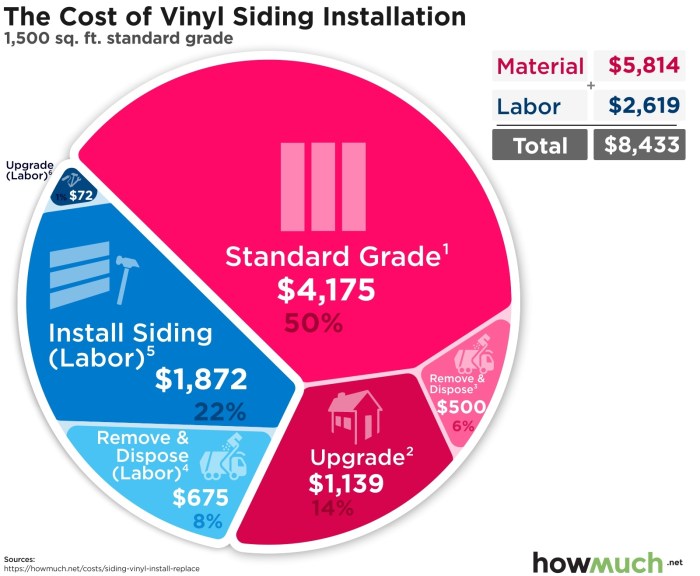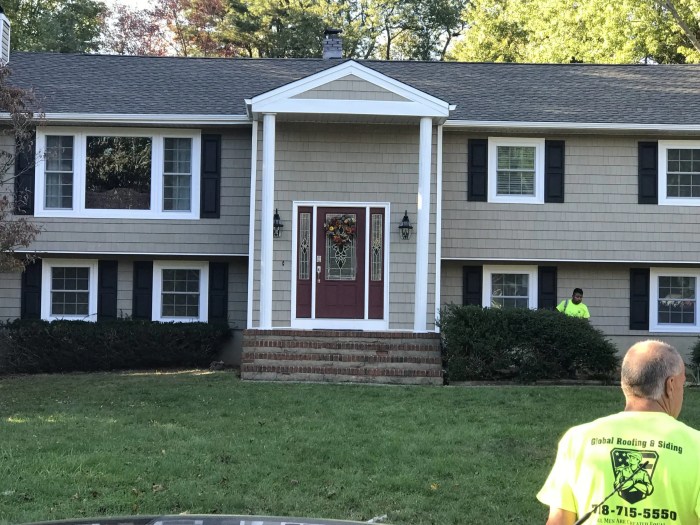Siding Contractors Near Me: Your Ultimate Guide to Quality Home Improvement
Exploring the world of siding contractors near me, this comprehensive guide dives into the importance of these professionals in enhancing your property. From choosing the right materials to understanding the installation process, this overview covers all you need to know.
Learn about the different types of siding services available, how to find the perfect contractor, factors influencing costs, and tips for maintaining your siding in top condition.
Importance of Siding Contractors
When it comes to home improvement projects, siding contractors play a crucial role in enhancing the overall look and functionality of a property. Their expertise in installing, repairing, and maintaining siding not only adds value to a home but also ensures its protection against harsh weather conditions.
Benefits of Hiring Professional Siding Contractors
- Expertise: Professional siding contractors have the knowledge and skills to handle various types of siding materials and installation techniques, ensuring a high-quality finish.
- Time-saving: Hiring professionals can save you time and effort, as they can efficiently complete the project in a timely manner without compromising on quality.
- Cost-effective: While it may seem more expensive upfront, hiring professional siding contractors can actually save you money in the long run by avoiding costly mistakes and repairs.
- Enhanced curb appeal: Siding contractors near me can help improve the curb appeal of your property by offering a wide range of siding options and design choices that complement your home's style.
How Siding Contractors Near Me Can Enhance Curb Appeal
By choosing siding contractors near me, you can benefit from their local expertise and knowledge of the best siding options for the area. They can recommend materials that are suitable for the climate and architectural style of your home, enhancing its overall curb appeal and increasing its value.
Types of Siding Services Available
When it comes to siding services, there are several types of siding materials commonly used by contractors. Each material has its own set of pros and cons, as well as varying maintenance requirements. Let's explore some of the most popular options below.
Vinyl Siding
Vinyl siding is a popular choice among homeowners due to its affordability and low maintenance requirements. It is available in a wide range of colors and styles, making it versatile for different aesthetic preferences. However, vinyl siding may crack or fade over time, and it is not as durable as other materials like fiber cement.
Wood Siding
Wood siding offers a natural and classic look to homes, adding warmth and charm. It can be easily painted or stained to match the desired color scheme. However, wood siding requires regular maintenance such as painting, staining, and sealing to protect it from rot, pests, and moisture damage.
Fiber Cement Siding
Fiber cement siding is known for its durability and resistance to termites, rot, and fire. It can mimic the look of wood or stucco, providing a high-end appearance. While fiber cement siding is more expensive than vinyl, it requires minimal maintenance and has a long lifespan.
Maintenance Requirements
Regardless of the siding material chosen, regular maintenance is essential to prolong its lifespan and keep it looking its best. This may include cleaning, inspections for damage, repairs, and repainting or resealing when necessary. Proper maintenance can prevent issues like mold growth, water damage, and premature deterioration of the siding.
Finding the Right Siding Contractor
When it comes to finding the right siding contractor for your home, it's essential to do your research and select a reputable professional. Here are some tips to help you make the best choice:
Research and Selection Process
- Start by asking for recommendations from friends, family, or neighbors who have recently had siding work done.
- Check online reviews and ratings on trusted websites to get an idea of the contractor's reputation.
- Verify that the contractor has a valid license to operate in your area and that they are insured to protect you from any liability.
- Request references from the contractor and follow up with past clients to ensure they were satisfied with the work.
Importance of Checking Licenses, Insurance, and References
Checking licenses, insurance, and references is crucial to ensure that the siding contractor you hire is qualified, reliable, and capable of completing the job to your satisfaction.
- A valid license demonstrates that the contractor has met the necessary requirements and standards set by the state or local authorities.
- Insurance protects you from any potential accidents or damages that may occur during the siding installation process.
- References provide insight into the contractor's track record and the quality of their work, helping you make an informed decision.
Obtaining Multiple Quotes
- Get quotes from at least three different siding contractors to compare prices, services, and timelines.
- Ensure that each quote includes a detailed breakdown of the costs, materials, and scope of work involved.
- Choosing the lowest-priced contractor may not always be the best option; consider the overall value and reputation of the contractor.
Siding Installation Process
When it comes to a siding installation project, there are several typical steps that siding contractors follow to ensure a successful outcome. From preparation to finishing touches, each step plays a crucial role in the overall process.
Steps Involved in Siding Installation
- Preparation of the work area, including removing old siding if necessary and ensuring the surface is clean and ready for installation.
- Measurement and cutting of siding materials to fit the specific dimensions of the property.
- Installation of siding panels or pieces according to the manufacturer's guidelines and industry best practices.
- Sealing and securing the siding to prevent moisture infiltration and ensure durability.
- Finishing touches such as caulking, painting, or adding trim to enhance the aesthetic appeal of the siding.
Tools and Equipment Used
- Hammer and nails for securing siding panels.
- Siding cutter or saw for cutting siding materials to size.
- Level and measuring tape for accurate installation.
- Caulking gun for sealing joints and edges.
- Ladder or scaffolding for reaching higher areas of the property.
Duration of Siding Installation
The time it takes to complete a siding installation project can vary depending on factors such as the size of the property, the complexity of the design, and the weather conditions. On average, a siding installation project can take anywhere from a few days to a couple of weeks to complete.
It is essential to discuss the timeline with your siding contractor before the project begins to have a clear understanding of the expected duration.
Cost Factors and Budgeting

When it comes to hiring siding contractors, there are several factors that can influence the overall cost of the project. Understanding these factors and effectively budgeting for your siding installation or repair project is crucial to ensure a smooth and successful outcome.
Below, we will discuss the key cost factors, budgeting tips, and how to negotiate pricing with siding contractors.
Factors Influencing Cost
- The size of your home: Larger homes will require more materials and labor, leading to higher costs.
- The type of siding material: Different siding materials vary in price, with options like vinyl, wood, fiber cement, and metal all having different price points.
- The extent of repairs needed: If your siding requires extensive repairs or replacements, this will increase the overall cost of the project.
- Additional features: Adding extra features such as insulation, trim work, or decorative elements can also impact the cost.
Budgeting Tips
- Research and compare quotes from multiple siding contractors to ensure you are getting a fair price.
- Set aside a contingency fund for unexpected expenses that may arise during the project.
- Prioritize necessary repairs or replacements over cosmetic upgrades to stay within your budget.
- Consider financing options or payment plans if the cost of the project exceeds your budget.
Negotiating Pricing
- Be clear about your budget and expectations upfront to avoid any surprises later on.
- Ask for a detailed breakdown of the costs involved in the project to better understand where your money is going.
- Don't be afraid to negotiate with siding contractors to see if there is any room for flexibility in pricing.
- Consider bundling multiple services or projects together to potentially receive a discount on the overall cost.
Maintaining Siding Over Time
Regular maintenance and inspections play a crucial role in preserving the integrity and longevity of your siding. By taking proactive measures to care for your siding, you can prevent costly repairs and ensure that your home remains well-protected against the elements.
Common Issues with Siding and How to Address Them
- Moisture Damage: Water infiltration can lead to mold, mildew, and rot. Inspect your siding regularly for signs of water damage, such as discoloration or warping. Address any issues promptly by replacing damaged sections and sealing gaps to prevent further water intrusion.
- Cracks and Holes: Over time, siding may develop cracks or holes due to age or impact damage. These openings can allow moisture and pests to enter your home. Fill in cracks with caulking or replace damaged sections to maintain the integrity of your siding.
- Fading and Discoloration: Exposure to sunlight and harsh weather conditions can cause siding to fade or change color. To prevent fading, consider using UV-resistant paint or siding materials. Regular cleaning and maintenance can also help preserve the appearance of your siding.
Tips for Extending the Lifespan of Siding
- Clean Regularly: Remove dirt, debris, and mold from your siding by washing it with a mild detergent and water. This helps prevent the buildup of grime and prolongs the life of your siding.
- Trim Vegetation: Keep trees, bushes, and vines trimmed away from your siding to prevent damage from branches or roots. Overgrown vegetation can also trap moisture against your siding, leading to rot and decay.
- Inspect Annually: Schedule a yearly inspection of your siding to check for any signs of damage or wear. Addressing issues early can prevent them from escalating into major problems that require costly repairs.
Conclusive Thoughts
In conclusion, siding contractors near me play a crucial role in transforming your home's exterior. By following the guidelines Artikeld in this guide, you can make informed decisions and ensure a successful siding project for your property.
Commonly Asked Questions
How can siding contractors enhance curb appeal?
Siding contractors near me can improve curb appeal by using high-quality materials and expert installation techniques that enhance the overall look of your property.
What factors should homeowners consider when budgeting for siding projects?
Homeowners should consider the size of the project, choice of materials, labor costs, and any additional services required when budgeting for siding projects.
How often should siding be inspected for maintenance?
Siding should be inspected at least once a year to check for any damage, moisture issues, or signs of wear and tear that may require maintenance.
Can siding contractors provide references for past projects?
Reputable siding contractors should be able to provide references from past projects to showcase their expertise and quality of work.
Is negotiating pricing common with siding contractors?
Homeowners can negotiate pricing with siding contractors, especially when comparing quotes from multiple providers to ensure they get the best value for their money.




